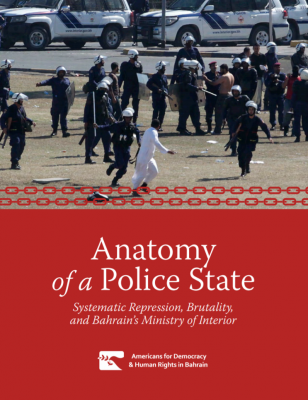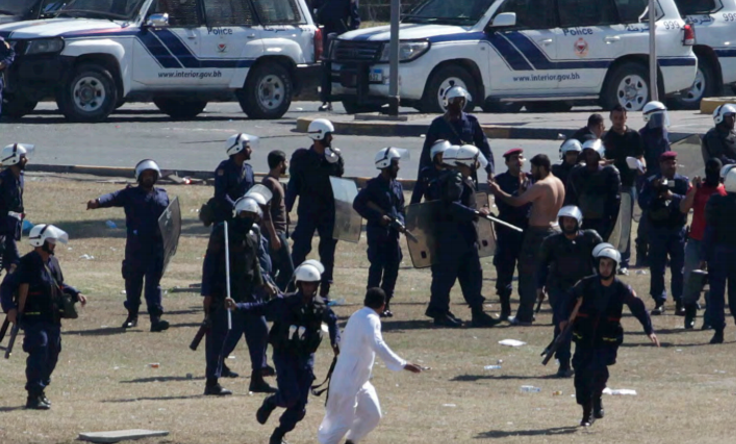
Americans for Democracy & Human Rights in Bahrain (ADHRB) is pleased to release Anatomy of a Police State: Systematic Repression, Brutality, and Bahrain’s Ministry of Interior, a comprehensive look at the core security agency driving Bahrain’s human rights crisis. See the introduction to the report below, and click here to read the full report.
Introduction
A comprehensive look at the core security agency driving Bahrain’s human rights crisis, Anatomy of a Police State is the first full study of the Ministry of Interior (MOI) police force’s integral role in the kingdom’s repression of dissent. It reveals that the MOI has led Bahrain’s catastrophic devolution into a police state even as it has received millions of dollars from countries like the United States (US) and the United Kingdom (UK), presenting overwhelming evidence of widespread gross human rights violations perpetrated as a matter of government policy.
Drawing on years of primary documentation, Americans for Democracy & Human Rights in Bahrain (ADHRB) analyzes over 1,000 discrete incidents of abuse comprising more than 3,000 specific rights violations attributable to MOI agencies from 2011 through to the present day, from arbitrary detention and torture to rape and extrajudicial killing. The report demonstrates a clear pattern of police brutality and repression at every command level of the MOI, with the same types of violations perpetrated by the same units consistently over time.
Despite Bahraini government claims that misconduct is isolated to a few “bad apples,” our documentation proves that serious violations like torture are the product of de facto policy generated not just by a culture of impunity, but also by a system of incentives aimed at rewarding perpetrators. As the government has gradually tasked the MOI with enforcing new and more stringent prohibitions on fundamental freedoms, the most ruthless officers are distorted into the most effective officers – and they are promoted, not punished.
No amount of superficial reform, training, or international assistance will prevent abuse when law enforcement has become synonymous with repressing basic human rights. This is the reality of the modern Bahraini police state, and the kingdom’s partners must immediately suspend cooperation with all those responsible within the MOI. Moreover, with a view toward stemming the tide of abuse and compelling real accountability measures, we urgently call on the international community to impose sanctions on key perpetrators across all MOI agencies and command echelons, up to and including Interior Minister Sheikh Rashid bin Abdullah Al Khalifa.
Key Findings
- Bahrain is among the most heavily policed countries in the world, with approximately 46 MOI personnel for every 1,000 citizens. That is more than double the comparable rate at the height of Saddam Hussein’s dictatorship in Iraq, which dwarfed similar regimes in Iran and Brazil.
- The MOI police force is the single most abusive government agency in Bahrain, with more than 1,000 incidents of severe abuse documented by ADHRB within a seven-year period. For comparison, that is 200 more cases than were recorded by the US War Crimes Working Group for the 20-year conflict in Vietnam.
- As many as one in every 635 Bahrainis has been arbitrarily detained, disappeared, tortured, raped, killed, or otherwise abused by the police according to our data. In just our sample subset, the MOI is directly implicated in 570 cases of torture and 517 arbitrary detentions, with personnel committing around 400 specific human rights violations annually, including 13 sexual assaults per year.
- Bahrain has the highest rate of mass incarceration in the Middle East, with thousands held in MOI detention centers that universally violate international standards.
- The oversight mechanism meant to hold police accountable, the MOI Ombudsman, has referred just 5% of cases for serious prosecution. At the end of 2017, only three police officers were in prison.
- The senior-level officer cadre is virtually immune from prosecution and has been continuously promoted since 2011 with the explicit approval of the king, prime minister, or interior minister. Of 12 senior commanders identified by ADHRB within the MOI’s top 8 abusive units, every single one reached a higher rank or command post despite evidence of severe rights violations. Just one faced prosecution, and he was promptly acquitted and promoted.
Throughout this period of escalating repression, Bahrain’s chief western allies have consistently trained, funded, and equipped the MOI’s most brutal sub-agencies – with more than $13 million in support from the US and UK alone. Our report finds that:
- Despite ongoing restrictions on American arms sales to the MOI over rights concerns, police continue to receive training for their largely US-made arsenal.
- From 2007 to 2017, the American taxpayer provided nearly $7 million in security assistance to the MOI and specifically the riot police – a notorious national police force responsible for dozens of extrajudicial killings, countless protest raids, and reprisal attacks on prisoners.
- President Donald Trump is now extending MOI training programs after units failed Leahy Law vetting under the Obama Administration, proposing an extensive 10-course program for 2019 that includes advice on “attack methodologies.”
- The UK, which played a direct role in the formation of the Bahraini police during the 20th century, has provided over £5 million to the MOI and the kingdom’s accountability mechanisms, taking no steps to limit cooperation.
- Canada and France, likewise, are supporting programs for the MOI’s medical division, which is infamous for denying medical care to detainees and interfering in torture investigations.
- Companies from the UK, Canada, Italy and elsewhere have sold surveillance technology to the MOI in violation of export controls, directly enabling police to track and detain human rights activists.





